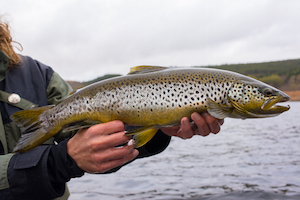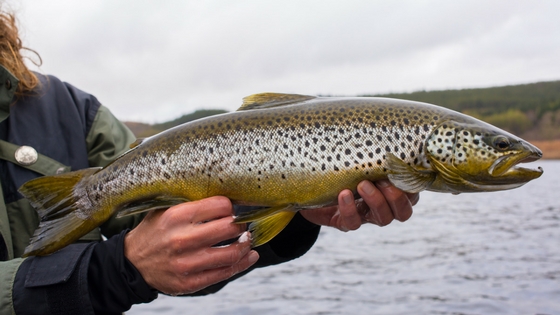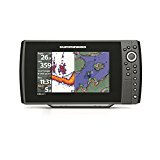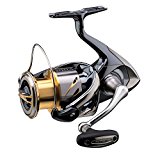Brown Trout River Fishing

 Brown Trout are a territorial species. They like to stake out a protected home area near the edges of fast currents.
Brown Trout are a territorial species. They like to stake out a protected home area near the edges of fast currents.
Check out these techniques and tips to put the odds in your favor.
- Any obstruction in the water that may provide cover for the light-sensitive fish is a good area to cast.
Brown Trout flies
Fly fishing is certainly one of the most rewarding types of fishing. For areas that have a lot of cover and sunken debris, focus on dry flies.
The best time of year for night fly fishing is in the spring when the Brown Trout can be found at the mouths of rivers and new the shore line.
During spring, the air is filled with insects that fall into the water from over hanging trees. Using flies that closely resemble the local river insects in size and color will increase the odds in your favor.
*Common insects that work in most places include mayflies and dragon flies.
A generally dependable Brown Trout fly is a Muddler Minnow with a gold colored body.
In areas where the trout are not actively feeding on the surface, large weighted nymphs and streamers are consistent producers.
Brown Trout Fishing Tips
Fish for Brown Trout in the same waters as described for rainbow and brook trout. But remember that the warm water coupled with the ‘low-oxygen tolerant’ Brown Trout may be overlooked by anglers that bypass the slow, deep pools in the river.
As with largemouth bass, cast your line close to rock piles, brush mounds and submerged logs.
The large Brown Trout tend to be more open to the foods that they’ll eat. They’ve even been known to go after water snakes, 10 inch brook trout, young muskrats, and birds.
Brown Trout like crawfish, earth worms and minnows – both golden shiners and fathead minnows.
You should have plenty of luck casting at dusk, night and during overcast days and in shaded spots. However, don’t expect them to come out into the open. The exception to this rule being the big Brown Trout that will come out at night.
Lures for Brown Trout and presentation
Presenting spinning lures and spoons is not an easy task at night, especially since Brown Trout prefer protected brushy areas in rivers. This need to stay hidden is diminished at night and they are more likely to wander near the shore and mouths of rivers.
Choose gold-finished spinning lures and spoons, fished slowly downstream, consistently will catch the larger browns.
- If a fish approaches the lure but is hesitant to strike, try resting the lure for 10 to 20 minutes. Spoons and spinners are more effective when the moon is full.
Just remember not to retrieve the lure too quickly.
Technique for using casting tackle
- Use medium-weight spinning or bait casting tackle and thread the minnow on a No. 4 hook
- Tie the hook directly to the fishing line and add enough weight a foot-and-a-half above the hook to bring the minnow to the river bottom in a fast current
- Line weight should be 8 or 10 pounds of monofilament
- Cast upstream from where you expect the Brown Trout to reside
- Let the current carry the bait. Direct the bait by lifting the rod tip to avoid hang-ups
- If the bait gets caught and the line must be cut, the fishing spot is generally ruined for the rest of the day
Once the bait reaches the suspected fish’s hideout, let it sit for as long as patience allows.
Deep Pools and Riffles
In large, open rivers with few obvious obstructions for the trout, the fish will likely reside in the deepest water holes, or riffles, behind rocks or other breaks in the river current. Undercut banks and other objects provide effective cover and are often good fishing grounds.
Cast weighted lures, including lead-head jigs, tailed with a minnow, night crawlers, or crawfish. Do so by casting the lure upstream and hold the rod diagonal to the current for best results.
Again, you’re not trying to win a race. Brown trout will take notice of a fast lure, but they will not go for it.
When dealing with murky water, fishing for Brown Trout will prove more difficult. Your best bet is to fish with spinners and spoons due to their reflectivity. Lures that make noise that resemble the sounds of a wounded bait fish are also effective in these conditions.


